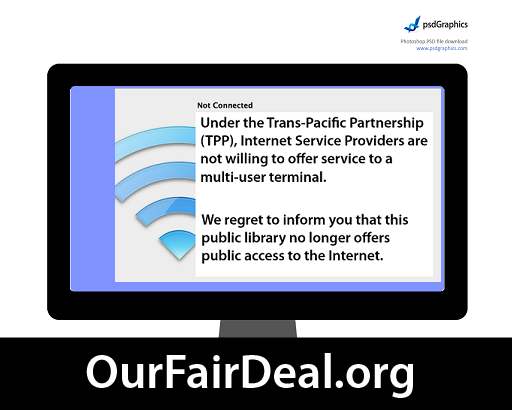The latest round of TPP talks is more closed to the public than ever
TPP officials do more than ever to keep citizen voices away
*UPDATE: Since publishing this artcle on Monday, August 26th, we were shocked to learn of last minute changes to the the Brunei round's "Stakeholder Day", which saw the formal stakeholder briefing from the TPP Chief Negotiators cancelled, and, therefore, eliminated the opportunity for stakeholders to ask questions in forum where all could hear the answer. Additionally, stakeholder presentations were shortened from 15 to 7 minutes in length without warning. The text below has been amended to reflect this.
It seems that the lobbyists and unelected trade representatives behind the Trans-Pacific Partnership (TPP) talks—the ones which, according to leaked documents, threaten to criminalize everyday uses of the Internet in several countries—are getting less and less tolerant of public interest representatives.
We’ve written before about how TPP talks are taking place behind closed doors. The TPP texts are so secretive that few public officials have even seen them – never mind citizens. But now we have even more reason to be ..irked... at the very least.
In the past, the TPP talks, while excluding public interest stakeholders from any meaningful discussion, have included a few hours for "Stakeholder Presentations". The Electronic Frontier Foundation’s Maira Sutton summarizes these well:
These so-called "Direct Stakeholder Events" are a joke. It is a way for the USTR [U.S. Trade Representative] to take photos of public interest group representatives and claim that they are providing opportunities for public participation, when in fact, they continue to negotiate TPP in secret without releasing any of the text or proposals for this powerful international agreement.
Nevertheless, as representatives of a global pro-Internet movement, we take every opportunity we can get. A briefing here, a small window to present citizen outcry there.
In the leadup to this week’s round of negotiations in Brunei, however, organizers of the TPP talks decided to make things much more difficult for those public interest groups that wished to participate.
For one thing, the date of the stakeholder day has changed at least once.[1] For many groups—especially ones like OpenMedia that run on a shoestring budget—this is a huge impediment to participation[2]. Brunei, a notably undemocratic nation, is not the home of most of the stakeholder groups that would be presenting. And those airplane tickets and hotel rooms don’t exactly come cheap.
Another fun change that was made at the last minute: the TPP Chief Negotiators cancelled their formal stakeholder briefing. This made it so stakeholders could not ask the negotiators questions in a forum where all could hear their answers. Instead organizers proposed “dialogues” with TPP officials, in which public interest groups and lobbyists must throw elbows and battle for attention. Additionally, stakeholder presentations were shortened from 15 to 7 minutes in length - hardly enough time to say anything of substance.
Why make public participation so difficult? Well from what we know of the TPP (again, from leaked documents), it’s because the decisions that are being made would spark outrage. The intellectual property proposals in this agreement restrict the open Internet, access to knowledge, economic opportunity, and our fundamental rights. And it’s likely that we’re only scratching the surface.
The lack of transparency and room for citizens and public interest groups to speak out is nothing short of appalling. Agreements like the TPP should not be made in ways that are so undemocratic. In this digital age—when participatory policy-making is easier than ever and citizens are increasingly eager to make our voices heard—we should be able to expect openness, accountability, and transparency from decision makers. It’s only fair.
Learn more about the TPP and sign the petition for a fair deal at http://ourfairdeal.org. Let’s make sure we’re impossible to ignore. And don't forget to share this image we've created:



Footnotes
[1] One of the changes to the date is recorded here by the New Zealand Ministry of Foreign Affairs & Trade
[2] We know of at least one group that pulled out of the TPP stakeholders’ round due to unexpected changes. As one organizer wrote in an email: "Unfortunately the Japanese people [a public interest group] have pulled out because there is too little information about how they can participate - for example no stakeholder events announced, etc. I told them they should wait because sometimes this happens at the last minute, but they can't justify the trip internally unless there is a more concrete reason for it."


 Take action now!
Take action now!
 Sign up to be in the loop
Sign up to be in the loop
 Donate to support our work
Donate to support our work